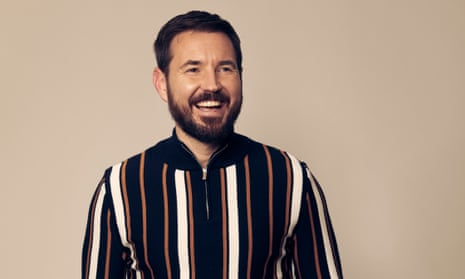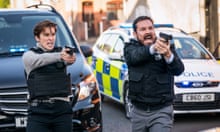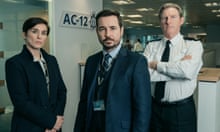Actor Martin Compston, 36, was born and raised in Greenock, Scotland. Despite having never acted before, he auditioned successfully for the lead role in Ken Loach’s Sweet Sixteen, which was being shot locally, winning most promising newcomer at the British independent film awards in 2002 for the role. He’s now best known for playing DS Steve Arnott in hit police thriller Line of Duty, which returns for its sixth series tonight.
How does Line of Duty’s new series compare with previous ones?
It’s back to basics and another belter. I loved the early series when we were still on BBC Two, because I felt we could be more subtle. The jeopardy was all about back-stabbing and subterfuge, whereas when we made the jump to BBC One, it became a bit flashier. Now we’re established in that primetime slot, we’ve gone back to what made the show great. There are still some big set pieces, which are fun, but a lot of the drama unfolds in dark alleys or shady meetings. Series three was a favourite of ours because it was the culmination of a three-series story. This feels similar, like it ties up the next chapter. We’re coming to another climax and a lot of big questions get answered.
Does the trademark Line of Duty darkened underpass make an appearance?
It does. Funnily enough, that underpass is just around the corner from where we stay in Belfast during production. Sometimes, if we’re coming back after a night out and a wee bit pissed, we’ll film our own impromptu scenes down there on our phones.
Your character, Steve Arnott, is in a difficult place as the new series begins. Why?
He’s struggling with back problems and painkiller issues after getting thrown down the stairs in series four. As an actor, that’s a gift to play, because there’s duplicity. Steve’s putting on a brave face at work, still turning up in his flashy suits and trying to run the show, but at home he’s falling to pieces. He’s a workaholic who defines himself by his job, but he’s in danger of losing it all.
Is his new beard an outward sign of his inner turmoil?
Aye, maybe. I usually grow one between series, because I still look like a schoolboy clean-shaven. When the BBC repeated the first two series during lockdown, me and Vicky [McClure, AKA DI Kate Fleming] were texting, saying: “How did anyone trust us with a cop show? We look about nine.” The new series is set 18 months after series five, so Steve’s different look reflects that passage of time.
The character’s become known for his trademark waistcoats. Was that your idea?
Yeah. Anything to get out of those sweater vests from series one. We still wanted him in layers for the second series, just to look a bit different to the average cop in a Marks & Spencer suit. The waistcoats are partly because he thinks he’s Sherlock Holmes, one of the great detectives, and partly because he’s the overdressed prick at work, having all the office affairs.
Do you get given waistcoats as presents now?
Actually, Adrian [Dunbar, AKA Supt Ted Hastings] bought me one as an end-of-series gift. I bought him a Celtic top and he bought me this beautiful waistcoat. Problem is, playing Steve has killed them for me. I cannae wear them any more. It’s like putting on the character.
Have you been offered lucrative waistcoat sponsorship deals?
I’m still waiting for that. But I am available.
Storylines are top secret. Is security tight?
We used to get sent our scripts in the post. Now there are watermarks, passwords, all sorts. What’s tough is the circus that follows us around during filming now. Crowds gather, and if you’re trying to do intimate scenes on the street, it’s non-stop camera flashes. Subtle things in your costume or behaviour could become spoilers, so we have to be extra careful. That’s why those night-time alleyway scenes are great because we can fly under the radar. I’m just lucky that when I was younger and in my wild days, cameraphones weren’t a thing. You could get away with being pissed and falling about in the street.
Steve Arnott has a London accent, which is very different to yours. Does that still surprise people?
I don’t break accent when we’re filming, so a lot of people just think that’s how I talk. I put a lot of work into it. We do 35-minute takes with 25 pages of dialogue, so the accent can start to slip towards the end of a long day’s filming. Or on pint four, if we’re out for the night. It takes a lot out of you – I start talking to myself in English, dreaming in English. You find different shades of yourself. I’m definitely more cocky in a London accent.
Did you base the voice on anyone?
Nick Leeson, the rogue trader, was a big inspiration – working class, highly intelligent, with a certain sense of entitlement. Me and my dialect coach listened to him a lot.
Line of Duty is renowned for its long interview scenes. What’s it like filming them?
They’re both an actor’s dream and nightmare. When you get the script, you faintly hope you’re not in them, but then if you’re not, you’re devastated. It’s the boom guys I really feel sorry for – you can see their arms shaking. It’s a tough day’s work. We’ve got a couple of pretty epic ones this series.
Do the police lingo and acronyms make it harder?
The dialogue can be tough, especially on top of the accent. I used to learn all the dates, licence plate numbers and evidence reference codes as a badge of honour, then Jed [Mercurio] said: “Just consult your notes. It’s what a real police officer would do.” They wouldn’t learn all that information off by heart and risk getting something wrong. It’s more realistic to look down and read it from a folder.

Don’t you, Adrian, Vicky and Jed have a curry club?
We go for a curry at least weekly while we’re shooting. Jed really knows his Indian food, so he tends to do the ordering. As long as there’s a few Cobras at the table, we all muck in. Socialising wasn’t possible this series, but we’re having a Zoom curry this week. We’re really close.
What was it like having Kelly Macdonald as AC-12’s adversary this series?
Kelly’s such an icon in Scotland. For me, she’s had the perfect career: she was in Trainspotting, she was in Boardwalk Empire, one of my all-time favourite shows, and she starred in her own Scottish Pixar film [2012’s Brave]. I was extremely excited to work with her and she slotted in straight away. It was reassuring to see the great Kelly Macdonald daunted by the interview scenes as well. Her character [DCI Joanne Davidson] is so enigmatic, you can’t figure out which side she’s on.
Will there be another series after this one?
It always depends on audience reaction and whether there’s a desire for more. We want to leave a good legacy and be remembered as one of the great shows, not for a disappointing final series. But this was a strange one to make, thanks to the horror show we’ve all been living through. We had a seven-month filming break, then came back under all the restrictions. The crew had to keep their distance. Masks made it harder to make a connection. The atmosphere on set wasn’t the same. It would be tough to end it that way. So on a personal level, it would be nice to do at least one more when life was back to normal and we could have a proper send-off.
You were still at school when you auditioned for Sweet Sixteen. What were the pros and cons of beginning your career so young?
It was a mad start. I had no experience, so didn’t know what I was getting into. In some ways, that was an advantage. I’d be terrified going on to a Ken Loach film set now, but back then I didn’t give a fuck. I was fearless. I got [BBC drama] Monarch of the Glen a year later and that was a huge education too – three years on a big Sunday night show, working with legends such as Susan Hampshire and Tom Baker. That’s where I learned my craft in terms of learning lines and hitting marks.
Is it a shame that drama school is increasingly becoming for the privileged few?
Drama school is a phenomenal thing, in that you can be with like-minded people and study the classics, but it would’ve taken the edge off me. I’ve always relied on my instincts. Vicky and Jed are similar – they’re also from humble backgrounds and learned on the job. We have such a strong work ethic because we’ve had to fight for everything and kick down doors.
How did you spend lockdown when you weren’t working?
Reading as much as I can, working out and trying to learn a couple of languages: Spanish and Scottish Gaelic. I’ve really knuckled down on those.
What projects are in the pipeline?
I’ve just finished Vigil, a BBC submarine drama with an outstanding cast. That’s out later this year. I’m about to shoot two shows back to back: the second series of [crime drama] Traces, followed by The Rig, a new Amazon thriller about a crew trapped on an oil rig. It’s filming in Scotland so I can nip home to Greenock during my time off, which will be a joy.
You once had a promising professional football career. Do you still play?
Not regularly. I’m getting old and slow. If I play a game, I can’t walk for a week. But I’ve played a few of those Soccer Aid pro-celebrity matches, which are a dream come true. I remember Harry Redknapp giving a team talk, saying: “Right, the midfield is going to be Compston, [Yaya] Touré and [Juan Sebastián] Verón.” You’re like: “What the fuck? Did I hear that right?” I got the team bus from London up to Old Trafford, sat next to José Mourinho telling stories about Milan and Madrid. It was like I’d gone to football heaven.
Line of Duty returns to BBC One at 9pm tonight










Comments (…)
Sign in or create your Guardian account to join the discussion